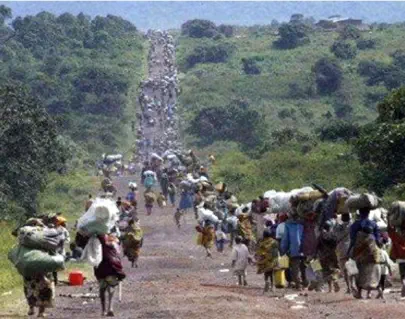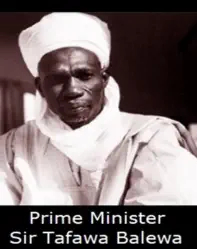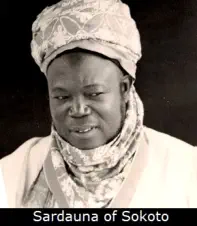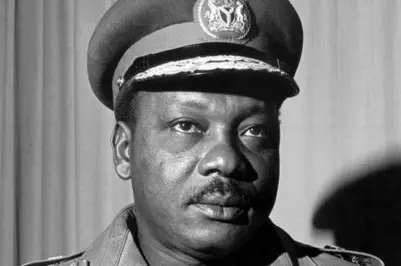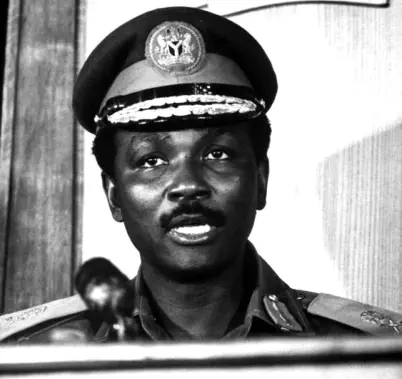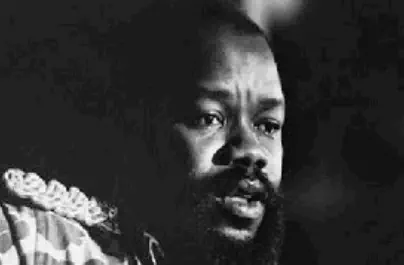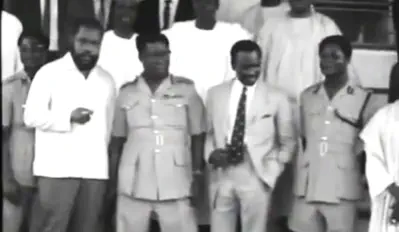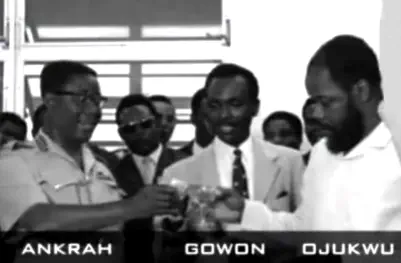IGBOFOCUS
Circumstances of Nigeria Biafra war
Background to the Nigeria civil war, the war which is today
known as "Biafra War" and or furthermore, the war is also
known as Nigeria Biafra War. The Nigeria Biafra War which
was fought from 1967 to 1970 that started over corruption,
misrule, abuses of power, etc. Abuses of power were so
rampant and corruptions were so endemic in Nigeria back
then, encouraged by misguided political leaders.
Nigerians got their independence in 1960 from the British
and it was not on the happy note or it was not a happy
ending one for the British. The British hated the people
from the south for seeking for independence. And loved
the people in the north for not seeking for independence.
Rather the people in the north wished that British to rule
forever. And the British loved them for that. The hatred of
the south and their punishment became number one
priority of the British in Nigeria. Soon British hatred of the south transcended from the British to the north hatred of the south.
Northern Nigeria hated the south so much that even one of their leaders, Sardauna of Sokoto said that they are willing to give job
vacancies in their region to the British and others, but they can only give southerners jobs in their region only by contract.
Above all, the British hated Igbo people more. Igbo people were hated the most by the British because they consider them far more
intelligent perhaps their smartness similar to them or even surpass them. Moreover Igbos prevented the British taking over part of
the north as their own colony.
In addition, another reason Igbos or easterners were hated the most would be that they went to the north in their drove to assist
northerners prepare themselves for independent so far that north considered themselves as not yet ready for independent. The
hatred is that the British did not want Igbo interference in the north, more or less coaching the north, that’s not what Britain had
wanted. Britain wanted north to be backwards forever so that they can be controlled easily.
However, finally Britain had an idea, to ensure that Britain is still controlling things in Nigeria even after independence, they devised it
in a way of ensuring that people from the north rule Nigeria continually, and in this way, they (British) are still in charged in Nigeria
because they will tell north what to do and north will obey and carry it out.
Even with the fact that the British told us recently that they rigged the first Nigeria election in favour of the north winning. Mind you,
not the British government had told us but those British people that they had used to carry out the rigging of Nigeria’s first election
told us that their conscience had been bothering them and they needed to clear their conscience. According to them, British
government had used census to manipulate the population figures. During the census, the British had counted 20 million people
extra in favour of the north. This means if the population of north is 50 million, then plus 20 million making a total of 70 million. As a
result, at the election, the fake 20 million had already voted for the north before even the election began. In this way, meaning that,
with 20 million votes at hand, plus votes coming from northern people, they cannot be beaten by the south.
The British revealed this to us recently what they have done in Nigeria back then but it is obvious that they have told northern leaders
back then what they have done and in addition showed them how to play the game to stay ahead.
Knowing all this back then, the northern leaders were totally engaged in corruption, misrule, election rigging, coup plotting, etc.
As mentioned above that the Nigeria Biafra War which was fought from 1967 to 1970 that started over corruption, misrule, abuses of
power, etc. Misrule, abuses of power were so rampant and corruptions were so endemic in Nigeria back then, encouraged by
misguided political leaders.
Back then, northern leaders extend their powers beyond their boundaries.
The prime minister, Sir Tafawa Balewa and Sardauna of Sokoto in 1964 used their powers to
carry out the first Nigerian coup; civilian to civilian coup in western region. The civilian to
civilian coup was such an abuse of power which Nigerians observed and that was beyond
their comprehension, how strenuous assault on a self-governing, whereby an elected
government was ousted by misguided political leaders by utilising fierce means and unfair
ends to interface on lawfully instituted government. Immortalised in 1964 when back then
the Premier of the Western Region, Sir Ladoke Akintola and his multitude of supporters in
collusion with the Sardauna of Sokoto and back then the Prime Minister Sir Tafawa Balewa,
when they seized powers belonging to the Western Region to impose Akintola upon the
people of the Region. Paradoxically at the same time the likes of Chief Awolowo and his
supporters were detained and tried on exceeded charges of coup plotting for which they
received burdensome sentences.
Nigerians watched in dismay of maladministration; the abuses of power during the
premature periods of independence when corruption and misrule were starting and about to
consume the country.
Back then, at that time, people were so touchy of abuses of power including coup plotting
and corruptions by perverted leaders. And on the 15th of January 1966 the army then had
tolerated enough of corrupt leaders, determined to stage a widely anticipated coup. The
coup was welcomed by everybody, vast majority of Nigerians throughout regional, religious
and ethnic divides.
The coup which was the second coup but the first national coup of its kind in Nigeria by the
army, and the coup was meant to rid corrupt leaders in the country. Some of the country’s
corrupt leaders were killed as a result including the prime minister, Sir Tafawa Balewa and
Sardauna of Sokoto. And along the line, the army had thought that this will facilitate the
eradication of corruption, misrule, abuse of power, etc., in Nigeria. However, in so doing, by
carrying out the coup, this had resulted to a countercoup and ultimately a civil war because
one region (north) believed that more of their leaders were killed over corruption and misrule
coup.
Subsequently of carrying out the coup; the coup plotters who decided to called themselves “Revolution of the Nigerian Armed
Forces.” The Revolution of the Nigerian Armed Forces after that coup devised a council called “Revolutionary Council.” The Council
affirmed that the aim of the Revolutionary Council is to establish a strong united and prosperous nation, free from corruption and
internal strife. Our method of achieving this is strictly military but we have no doubt that every Nigerian will give us maximum
cooperation by assisting the regime and not disturbing the peace during the slight changes that are taking place.
According to the Revolutionary Council’s communiqué at the time to Nigerians stated: My dear countrymen, no citizen should have
anything to fear, so long as that citizen is law abiding and if that citizen has religiously obeyed the native laws of the country and
those set down in every heart and conscience since 1st October, 1960. Our enemies are the political profiteers, the swindlers, the
men in high and low places that seek bribes and demand 10 per cent; those that seek to keep the country divided permanently so
that they can remain in office as ministers or VIPs at least, the tribalists, the nepotists, those that make the country look big for
nothing before international circles, those that have corrupted our society and put the Nigerian political calendar back by their words
and deeds. Like good soldiers we are not promising anything miraculous or spectacular. But what we do promise every law abiding
citizen is freedom from fear and all forms of oppression, freedom from general inefficiency and freedom to live and strive in every
field of human endeavour, both nationally and internationally. We promise that you will no more be ashamed to say that you are a
Nigerian.
Being that the Revolutionary Council had decided to choose the most senior army personnel as the head of state instead of installing
Chief Obafemi Awolowo that some of the coup plotters had in mind of releasing him from Calabar prison and installing him in as the
new head of state.
However, for the reason that the person that the Revolutionary Council had
decided to elect as the most senior army personnel is an Igbo man called
“General Johnson Aguiyi Ironsi” who became the head of state, the narrative
of the coup changed.
At that moment of selecting General Johnson Aguiyi Ironsi as the new head
of state, the whole narrative of the coup changed to the coup becoming an
Igbo coup. Straight away, for the reason that Igbo man was selected the new
head of state and one of the leading coup plotters was Igbo, they straight
away branded the coup “Igbo Coup.”
Now, let us see the list of those soldiers that carried out the coup:
1. Major Chukwuma Kaduna Nzeogwu (Midwest Region Igbo)
2. Major Adewale Ademoyega (Western Region – Yoruba), author of “Why we struck”
3. Capt. G. Adeleke (Western Region – Yoruba).
4. Maj. Ifeajuna (Midwestern Region – Igbo).
5. Lt. Fola Oyewole (Western Region – Yoruba), author of “The reluctant rebel”.
6. Lt. Robert (Bob) Egbiko* (Midwestern Region – Ishan).
7. Lt. Tijani Katsina (Northern Region – Hausa/Fulani).
8. Lt. O. Olafemiyan (Western Region – Yoruba).
9. Capt. Gibson Jalo (Northern Region – Bachama).
10. Capt. Swanton (Northern Region – Middle Belt).
11. Lt. Hope Harris Eghagha (Midwest – Urhobo).
12. Lt. Dag Warribor (Midwest – Ijaw)
13. 2nd Lt. Saleh Dambo (Northern Nigeria -Hausa)
14. 2nd Lt. John Atom Kpera (Northern Nigeria-Tiv).
Without hesitation, looking at the above list of soldiers that carried out the coup, how many Igbo soldiers are on the list among them?
Yet they branded it Igbo coup. At this point, for the reason that they had characterised it “Igbo Coup” Igbo people were hated
everywhere in the north of the country because they believed that Igbo people killed their leaders.
From then on, north started looking for a way to countercoup the first national coup. And their opportunity came six months after the
first coup. The second coup was shadily planned and executed, all to get at Igbo people. From the widely accepted first national coup
to widely unaccepted second national coup. The second coup was believed to be the plan of disgruntled Hausa-Fulani oligarchy,
where north used their majority in the army to carry out the second coup; by means of exploiting gullible armies like Yakubu Gowon,
Murtala Muhammed, Theophilus Danjuma and many others like them were implemented for the accomplishment of the second
coup.
On the 29th of July 1966, the north staged a countercoup, supervising by General
Yakubu Gowon, Murtala Muhammed, Theophilus Danjuma and many other
northern soldiers to overthrow then the head of state, General Johnson Aguiyi
Ironsi. As well as overthrowing General Aguiyi-Ironsi, they did not even spear his
life but killing him instantly. Theophilus Danjuma was the one who claimed to
have shot then the head of state, General Johnson Aguiyi Ironsi. General Yakubu
Gowon immediately took over as the new head of state.
As well as the northern soldiers killing the head of state who is Igbo, they
commenced on killing Igbo soldiers. Not satisfied with killing Igbo head of state
and Igbo soldiers, the northern soldiers began killing Igbo civilians and embarked
on looking for Igbo civilians to kill; Igbo civilians that the northern soldiers caught
were killed instantaneously by them. Igbo civilians everywhere in the north of the
country went into hiding for their own safety; thousands upon thousands of Igbo
civilians were caught in hiding, subsequently they were killed. And thanks for the
goodness of God, thousands of Igbo civilians managed to escape to eastern part
of the country. Soon everything intensified, the killing of Igbos escalated to other parts of the country. The killing of Igbos everywhere
in Nigeria continued. During this period, Igbo people living in other parts of Nigeria had no option but to evacuate to eastern part of
the country to be free.
The killing of Igbo people went on for several days; even though that General Yakubu Gowon took over as the new head of state and
as the new head of state, he could have stop the killings but he didn’t. Rather General Yakubu Gowon as the new head of state did
nothing but to encourage the killing of Igbos. Thousands of Igbo people were besieged and killed in predominantly Igbo business
areas especially in the north. Most of the Igbo people killed were hacked to death with machetes, dagger, and other weaponry
instruments. Igbo people’s homes were looted including their businesses. Igbo businesses were looted and burned down. Thousands
of Igbos escaped in horror to their tribal fatherland in the eastern region of the country.
The whole exterminations of Igbos in the north, viewed as an indication showing that north is ready for their own independence. Also
a sign showing that Igbo people were not wanted in the north or anywhere in Nigeria, so they can equally go for their own
independence too. Mass slaughtering of Igbos for no cause, Lieutenant Colonel
Chukwuemeka Odumegwu Ojukwu, then the Military Governor of Eastern
Nigeria advised all Igbos to come to the eastern part of the country where Igbos
would be safe, saying that so far “it looked as Igbos are not wanted anywhere in
other parts of Nigeria.” Verbalising that if things continue uninterrupted, not
sorted out, we may break away to form our own government in the east.
Upon hearing the rumour that Eastern Region would break away to form their
own government, the north was quick to react, refusing by asking Igbos to
return back to the north. This was for the reason when all Igbos left the north
because of the killings, north was at a standstill, nothing was moving because
Igbos used to do a lot of things for them. Having no Igbos meant that nothing
was moving in the north and calling Igbos back to the north is only for the north’s advantage.
Igbos on the other hand needed consensus or unity agreements for staying on in Nigeria to prevent them from being killed in
numbers again. Igbos then concluded that unless there is harmony in the country otherwise they will break away to establish their
own country.
According to Igbos, the harmony should be drawn up and signed at a neutral ground. Ensuing that the request of unity agreement
to be on a neutral ground in order to be more conducive. Ghanaian leader then came to an agreement to host the meeting which
was prearranged to be held in a town in Ghana, at a place called “Aburi.”
The harmony or unity agreement which was now known as Aburi accord was named after the town in Ghana for the negotiation if
Eastern Region is going to be part of Nigeria again or not. Ghanaian President, Lieutenant-Colonel Joe Ankrah successfully hosted
the meeting.
See also: The Tape Recording of Aburi Meeting
Aburi Accord which was held in January 1967, the meeting was well attended by both representatives from the Federal
Government of Nigeria and Eastern Regional delegates. Discussions lasted for two days, from the 5th to 7th of January 1967 where
both parties agreed on the harmony.
As well as agreeing to maintain the peace, delegates from the federal
government side and those from the eastern region side efficaciously
signed the Aburi Accord.
Though in response to the accord, the federal government
promulgated Decree No. 8, this was for the most part an embodiment
of the accord.
It was also agreed that General Yakubu Gowon is the one to make a
speech on the decision reached when they get back to Nigeria.
However, getting back to Nigeria, General Yakubu Gowon refused to
make the speech.
According to him (Gowon), he was not well so he couldn’t make the
speech but many people argued that he has a deputy to deputise for
him if he is not well. Moreover, General Gowon could have somehow
informed Lt. Colonel Odumegwu Ojukwu instead of leaving him and
everybody in the country on abeyance.
Many believed that General Yakubu Gowon and those representatives
from the Federal Government of Nigeria’s side were not those in charge.
Those in charge were a group of British and Hausa-Fulani oligarchy
astonishingly in charge and these people don’t believe in negotiation,
they believe in corruption, misrule and war.
However, according to General Yakubu Gowon who quoted as saying that Lt. Colonel Odumegwu Ojukwu had confused him with
grammar, that he had no idea what confederation meant. When I got back, I contacted my advisers, the British exposed Ojukwu by
letting me know that what confederation really meant and they told me that it would undermine the federal government, and at
the same time instructed to refuse.
Correspondingly to some articles from the newspapers had General Yakubu Gowon saying: “Remembering that I attended the
Aburi conference feeling very sick, General Gowon said, “Unfortunately for me at that time I was having a very serious attack of
malaria fever. But I went through the meeting all the same. The decision we took was that when we come back, I am going to make
a statement to the nation before any of the governors make any statement concerning Aburi. But still, the fever was there and I
was down. As such, I was unable to make any statement on that day or the following day. Whereas Ojukwu when he came back, he
went straight to the radio station to say that he got everything and we even agreed to separate.
So I was woken up in the early hours of the morning by the governor of the Midwest who asked: “Have you heard the news or the
comments by Ojukwu over the air concerning Aburi?” “No,” I replied. “What did he say?”
And then I was told what he had said. So I asked the Midwest governor: “Was that what we agreed upon?”
“No, that was not,” he replied. “But Ojukwu has gone ahead to announce a different thing to his people and to the whole world.”
That was General Yakubu Gowon complaining.
Now, you don’t need to be a rocket scientist to evaluate what General Gowon said. According to him, he hadn’t announced the
outcome of Aburi accord after two days because he said: “As such, I was unable to make any statement on that day or the
following day.”
This is something of national importance that everyone in the country is waiting for, to know what was agreed on Aburi meeting.
And yet, the head of state is refusing to comment or say any word about it. Now you can understand the predicament of the
Nigeria military and civilians who said that the only way for them to know the truth and what’s happening in the country during the
war was really by listening to “Radio Biafra.”
Again Gowon contradicted himself by saying: “So I was woken up in the early hours of the morning by the governor of the Midwest
who asked: “Have you heard the news or the comments by Ojukwu over the air concerning Aburi?”
So being woken up early morning meant that the same morning is when the news was being aired. As a consequence that
morning was after the two days of waiting of non-announcement of Aburi decision which Odumegwu Ojukwu waited for Gowon to
make the speech but to no avail; Odumegwu Ojukwu then decided to make his own statement on Aburi meeting decision. So the
assertion by General Gowon that Odumegwu Ojukwu made the Aburi meeting decision speech immediately after getting back was
untrue.
As narrated above that Lt. Colonel Odumegwu-Ojukwu waited for General Yakubu Gowon to make the speech of aburi accord
decision to no avail. Ojukwu had no option but to make the speech of the decision reached at Aburi. At this stage, General Yakubu
Gowon was irritated for Lt. Colonel Ojukwu making the speech of Aburi decision saying that Odumegwu Ojukwu should have
waited for him and cancelled making any speech on the decision reached at Aburi.
Continue>>>

Nigeria Biafra War
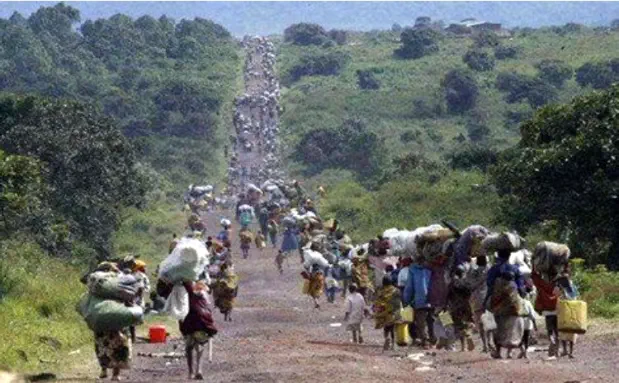
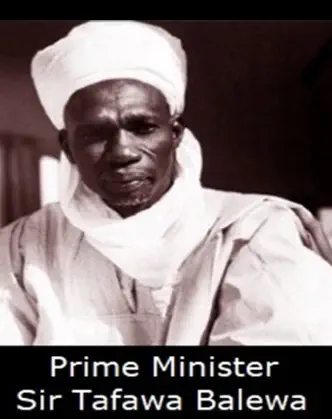
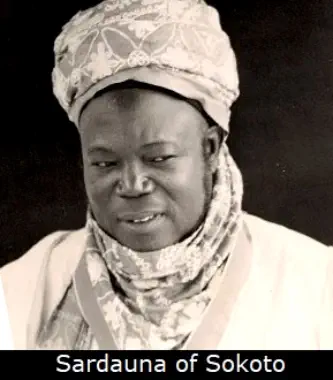
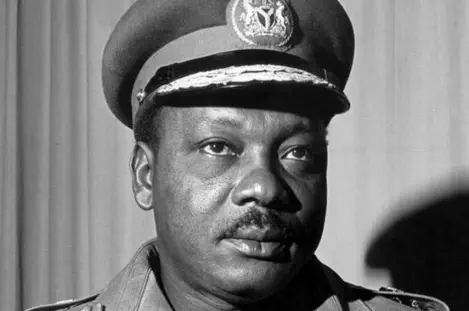
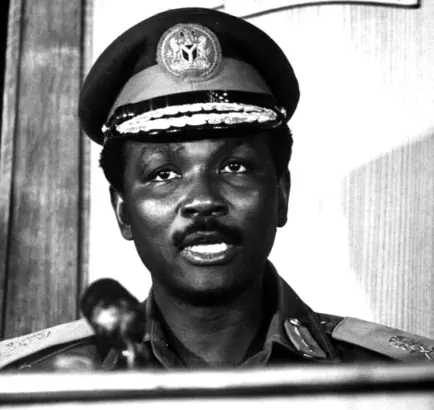
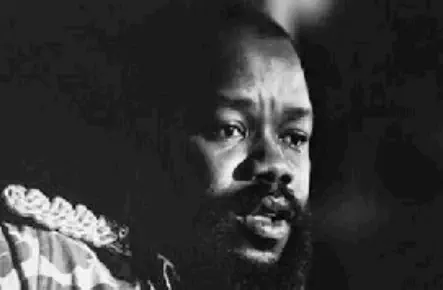

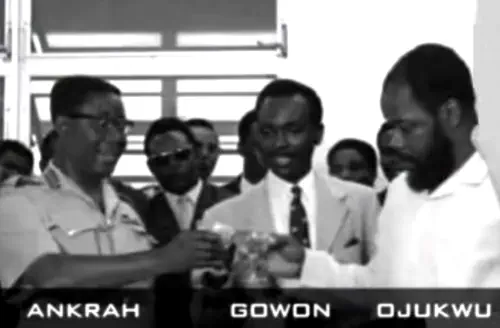























Nigeria Biafra War
Circumstances of
Nigeria Biafra war
Background to the Nigeria civil war, the war
which is today known as "Biafra War" and or
furthermore, the war is also known as Nigeria
Biafra War. The Nigeria Biafra War which was
fought from 1967 to 1970 that started over
corruption, misrule, abuses of power, etc.
Abuses of power were so rampant and
corruptions were so endemic in Nigeria back
then, encouraged by misguided political
leaders.
Nigerians got their independence in 1960 from
the British and it was not on the happy note or
it was not a happy ending one for the British.
The British hated the people from the south for
seeking for independence. And loved the
people in the north for not seeking for
independence. Rather the people in the north
wished that British to rule forever. And the
British loved them for that. The hatred of the
south and their punishment became number
one priority of the British in Nigeria. Soon
British hatred of the south transcended from
the British to the north hatred of the south.
Northern Nigeria hated the south so much that
even one of their leaders, Sardauna of Sokoto
said that they are willing to give job vacancies in
their region to the British and others, but they
can only give southerners jobs in their region
only by contract.
Above all, the British hated Igbo people more.
Igbo people were hated the most by the British
because they consider them far more
intelligent perhaps their smartness similar to
them or even surpass them. Moreover Igbos
prevented the British taking over part of the
north as their own colony.
In addition, another reason Igbos or easterners
were hated the most would be that they went
to the north in their drove to assist northerners
prepare themselves for independent so far that
north considered themselves as not yet ready
for independent. The hatred is that the British
did not want Igbo interference in the north,
more or less coaching the north, that’s not what
Britain had wanted. Britain wanted north to be
backwards forever so that they can be
controlled easily.
However, finally Britain had an idea, to ensure
that Britain is still controlling things in Nigeria
even after independence, they devised it in a
way of ensuring that people from the north rule
Nigeria continually, and in this way, they
(British) are still in charged in Nigeria because
they will tell north what to do and north will
obey and carry it out.
Even with the fact that the British told us
recently that they rigged the first Nigeria
election in favour of the north winning. Mind
you, not the British government had told us but
those British people that they had used to carry
out the rigging of Nigeria’s first election told us
that their conscience had been bothering them
and they needed to clear their conscience.
According to them, British government had
used census to manipulate the population
figures. During the census, the British had
counted 20 million people extra in favour of the
north. This means if the population of north is
50 million, then plus 20 million making a total
of 70 million. As a result, at the election, the
fake 20 million had already voted for the north
before even the election began. In this way,
meaning that, with 20 million votes at hand,
plus votes coming from northern people, they
cannot be beaten by the south.
The British revealed this to us recently what
they have done in Nigeria back then but it is
obvious that they have told northern leaders
back then what they have done and in addition
showed them how to play the game to stay
ahead.
Knowing all this back then, the northern leaders
were totally engaged in corruption, misrule,
election rigging, coup plotting, etc.
As mentioned above that the Nigeria Biafra War
which was fought from 1967 to 1970 that
started over corruption, misrule, abuses of
power, etc. Misrule, abuses of power were so
rampant and corruptions were so endemic in
Nigeria back then, encouraged by misguided
political leaders.
Back then, northern leaders extend their
powers beyond their boundaries.
The prime minister, Sir Tafawa Balewa and
Sardauna of Sokoto in 1964 used their powers
to carry out the first Nigerian coup; civilian to
civilian coup in western region. The civilian to
civilian coup was such an abuse of power which
Nigerians observed and that was beyond their
comprehension, how strenuous assault on a
self-governing, whereby an elected government
was ousted by
misguided political
leaders by utilising
fierce means and
unfair ends to interface
on lawfully instituted
government.
Immortalised in 1964
when back then the
Premier of the Western
Region, Sir Ladoke
Akintola and his
multitude of
supporters in collusion
with the Sardauna of
Sokoto and back then
the Prime Minister Sir
Tafawa Balewa, when
they seized powers
belonging to the Western Region to impose
Akintola upon the people of the Region.
Paradoxically at the same time the likes of Chief
Awolowo and his supporters were detained and
tried on exceeded charges of coup plotting for
which they received burdensome sentences.
Nigerians watched in dismay of
maladministration; the abuses of power during
the premature periods of independence when
corruption and misrule were starting and about
to consume the country.
Back then, at that time, people were so touchy
of abuses of power including coup plotting and
corruptions by perverted leaders. And on the
15th of January 1966 the army then had
tolerated enough of corrupt leaders,
determined to stage a widely anticipated coup.
The coup was welcomed by everybody, vast
majority of Nigerians throughout regional,
religious and ethnic divides.
The coup which was the second coup but the
first national coup of its kind in Nigeria by the
army, and the coup was meant to rid corrupt
leaders in the country. Some of the country’s
corrupt leaders were killed as a result including
the prime minister, Sir Tafawa Balewa and
Sardauna of Sokoto. And along the line, the
army had thought that this will facilitate the
eradication of corruption, misrule, abuse of
power, etc., in Nigeria. However, in so doing, by
carrying out the coup, this had resulted to a
countercoup and ultimately a civil war because
one region (north) believed that more of their
leaders were killed over corruption and misrule
coup.
Subsequently of carrying out the coup; the
coup plotters who decided to called themselves
“Revolution of the Nigerian Armed Forces.” The
Revolution of the Nigerian Armed Forces after
that coup devised a council called
“Revolutionary Council.” The Council affirmed
that the aim of the Revolutionary Council is to
establish a strong united and prosperous
nation, free from corruption and internal strife.
Our method of achieving this is strictly military
but we have no doubt that every Nigerian will
give us maximum cooperation by assisting the
regime and not disturbing the peace during the
slight changes that are taking place.
According to the Revolutionary Council’s
communiqué at the time to Nigerians stated:
My dear countrymen, no citizen should have
anything to fear, so long as that citizen is law
abiding and if that citizen has religiously
obeyed the native laws of the country and
those set down in every heart and conscience
since 1st October, 1960. Our enemies are the
political profiteers, the swindlers, the men in
high and low places that seek bribes and
demand 10 per cent; those that seek to keep
the country divided permanently so that they
can remain in office as ministers or VIPs at
least, the tribalists, the nepotists, those that
make the country look big for nothing before
international circles, those that have corrupted
our society and put the Nigerian political
calendar back by their words and deeds. Like
good soldiers we are not promising anything
miraculous or spectacular. But what we do
promise every law abiding citizen is freedom
from fear and all forms of oppression, freedom
from general inefficiency and freedom to live
and strive in every field of human endeavour,
both nationally and internationally. We promise
that you will no more be ashamed to say that
you are a Nigerian.
Being that the Revolutionary Council had
decided to choose the most senior army
personnel as the head of state instead of
installing Chief Obafemi Awolowo that some of
the coup plotters had in mind of releasing him
from Calabar prison and installing him in as the
new head of state.
However, for the reason that the person that
the Revolutionary Council had decided to elect
as the most senior army personnel is an Igbo
man called “General Johnson Aguiyi Ironsi” who
became the head of state, the narrative of the
coup changed.
At that moment of selecting General Johnson
Aguiyi Ironsi as the new head of state, the
whole narrative of the coup changed to the
coup becoming an Igbo coup. Straight away, for
the reason that Igbo man was selected the new
head of state and one of the leading coup
plotters was Igbo, they straight away branded
the coup “Igbo Coup.”
Now, let us see the list of those soldiers that
carried out the coup:
1. Major Chukwuma Kaduna Nzeogwu (Midwest
Region Igbo)
2. Major Adewale Ademoyega (Western Region
– Yoruba), author of “Why we struck”
3. Capt. G. Adeleke (Western Region – Yoruba).
4. Maj. Ifeajuna (Midwestern Region – Igbo).
5. Lt. Fola Oyewole (Western Region – Yoruba),
author of “The reluctant rebel”.
6. Lt. Robert (Bob) Egbiko* (Midwestern Region
– Ishan).
7. Lt. Tijani Katsina (Northern Region –
Hausa/Fulani).
8. Lt. O. Olafemiyan (Western Region – Yoruba).
9. Capt. Gibson Jalo (Northern Region –
Bachama).
10. Capt. Swanton (Northern Region – Middle
Belt).
11. Lt. Hope Harris Eghagha (Midwest –
Urhobo).
12. Lt. Dag Warribor (Midwest – Ijaw)
13. 2nd Lt. Saleh Dambo (Northern Nigeria -
Hausa)
14. 2nd Lt. John Atom Kpera (Northern Nigeria-
Tiv).
Without hesitation, looking at the above list of
soldiers that carried out the coup, how many
Igbo soldiers are on the list among them? Yet
they branded it Igbo coup. At this point, for the
reason that they had characterised it “Igbo
Coup” Igbo people were hated everywhere in
the north of the country because they believed
that Igbo people killed their leaders.
From then on, north started looking for a way
to countercoup the first national coup. And
their opportunity came six months after the
first coup. The second coup was shadily
planned and executed, all to get at Igbo people.
From the widely accepted first national coup to
widely unaccepted second national coup. The
second coup was believed to be the plan of
disgruntled Hausa-Fulani oligarchy, where
north used their majority in the army to carry
out the second coup; by means of exploiting
gullible armies like Yakubu Gowon, Murtala
Muhammed, Theophilus Danjuma and many
others like them were implemented for the
accomplishment of the second coup.
On the 29th of July 1966, the north staged a
countercoup, supervising by General Yakubu
Gowon, Murtala Muhammed, Theophilus
Danjuma and many other northern soldiers to
overthrow then the head of state, General
Johnson Aguiyi Ironsi. As well as overthrowing
General Aguiyi-Ironsi, they did not even spear
his life but killing him instantly. Theophilus
Danjuma was the one who claimed to have
shot then the head of state, General Johnson
Aguiyi Ironsi. General Yakubu Gowon
immediately took over as the new head of
state.
As well as the northern soldiers killing the head
of state who is Igbo, they commenced on killing
Igbo soldiers. Not satisfied with killing Igbo
head of state and Igbo soldiers, the northern
soldiers began killing Igbo civilians and
embarked on looking for Igbo civilians to kill;
Igbo civilians that the northern soldiers caught
were killed instantaneously by them. Igbo
civilians everywhere in the north of the country
went into hiding for their own safety;
thousands upon thousands of Igbo civilians
were caught in hiding, subsequently they were
killed. And thanks for the goodness of God,
thousands of Igbo civilians managed to escape
to eastern part of the country. Soon everything
intensified, the killing of Igbos escalated to
other parts of the country. The killing of Igbos
everywhere in Nigeria continued. During this
period, Igbo people living in other parts of
Nigeria had no option but to evacuate to
eastern part of the country to be free.
The killing of Igbo people went on for several
days; even though that General Yakubu Gowon
took over as the new head of state and as the
new head of state, he could have stop the
killings but he didn’t. Rather General Yakubu
Gowon as the new head of state did nothing
but to encourage the killing of Igbos.
Thousands of Igbo people were besieged and
killed in predominantly Igbo business areas
especially in the north. Most of the Igbo people
killed were hacked to death with machetes,
dagger, and other weaponry instruments. Igbo
people’s homes were looted including their
businesses. Igbo businesses were looted and
burned down. Thousands of Igbos escaped in
horror to their tribal fatherland in the eastern
region of the country.
The whole exterminations of Igbos in the north,
viewed as an indication showing that north is
ready for their own independence. Also a sign
showing that Igbo people were not wanted in
the north or anywhere in Nigeria, so they can
equally go for their own independence too.
Mass slaughtering of Igbos for no cause,
Lieutenant Colonel Chukwuemeka Odumegwu
Ojukwu, then the Military Governor of Eastern
Nigeria advised all Igbos to come to the eastern
part of the country where Igbos would be safe,
saying that so far “it looked as Igbos are not
wanted anywhere in other parts of Nigeria.”
Verbalising that if things continue
uninterrupted, not sorted out, we may break
away to form our own government in the east.
Upon hearing the rumour that Eastern Region
would break away to form their own
government, the north was quick to react,
refusing by asking Igbos to return back to the
north. This was for the reason when all Igbos
left the north because of the killings, north was
at a standstill, nothing was moving because
Igbos used to do a lot of things for them.
Having no Igbos meant that nothing was
moving in the north and calling Igbos back to
the north is only for the north’s advantage.
Igbos on the other hand needed consensus or
unity agreements for staying on in Nigeria to
prevent them from being killed in numbers
again. Igbos then concluded that unless there
is harmony in the country otherwise they will
break away to establish their own country.
According to Igbos, the harmony should be
drawn up and signed at a neutral ground.
Ensuing that the request of unity agreement
to be on a neutral ground in order to be more
conducive. Ghanaian leader then came to an
agreement to host the meeting which was
prearranged to be held in a town in Ghana, at
a place called “Aburi.”
The harmony or unity agreement which was
now known as Aburi accord was named after
the town in Ghana for the negotiation if
Eastern Region is going to be part of Nigeria
again or not. Ghanaian President, Lieutenant-
Colonel Joe Ankrah successfully hosted the
meeting.
See also: The Tape Recording of Aburi
Meeting
Aburi Accord which was held in January 1967,
the meeting was well attended by both
representatives from the Federal Government
of Nigeria and Eastern Regional delegates.
Discussions lasted for two days, from the 5th
to 7th of January 1967 where both parties
agreed on the harmony.
As well as agreeing to maintain the peace,
delegates from the federal government side
and those from the eastern region side
efficaciously signed the Aburi Accord.
Though in response to the accord, the federal
government promulgated Decree No. 8, this
was for the most part an embodiment of the
accord.
It was also agreed that General Yakubu Gowon
is the one to make a speech on the decision
reached when they get back to Nigeria.
However, getting back to Nigeria, General
Yakubu Gowon refused to make the speech.
According to him (Gowon), he was not well so
he couldn’t make the speech but many people
argued that he has a deputy to deputise for
him if he is not well. Moreover, General
Gowon could have somehow informed Lt.
Colonel Odumegwu Ojukwu instead of leaving
him and everybody in the country on
abeyance.
Many believed that General Yakubu Gowon
and those representatives from the Federal
Government of Nigeria’s side were not those
in charge. Those in charge were a group of
British and Hausa-Fulani oligarchy
astonishingly in charge and these people don’t
believe in negotiation, they believe in
corruption, misrule and war.
However, according to General Yakubu Gowon
who quoted as saying that Lt. Colonel
Odumegwu Ojukwu had confused him with
grammar, that he had no idea what
confederation meant. When I got back, I
contacted my advisers, the British exposed
Ojukwu by letting me know that what
confederation really meant and they told me
that it would undermine the federal
government, and at the same time instructed
to refuse.
Correspondingly to some articles from the
newspapers had General Yakubu Gowon
saying: “Remembering that I attended the
Aburi conference feeling very sick, General
Gowon said, “Unfortunately for me at that
time I was having a very serious attack of
malaria fever. But I went through the meeting
all the same. The decision we took was that
when we come back, I am going to make a
statement to the nation before any of the
governors make any statement concerning
Aburi. But still, the fever was there and I was
down. As such, I was unable to make any
statement on that day or the following day.
Whereas Ojukwu when he came back, he went
straight to the radio station to say that he got
everything and we even agreed to separate.
So I was woken up in the early hours of the
morning by the governor of the Midwest who
asked: “Have you heard the news or the
comments by Ojukwu over the air concerning
Aburi?” “No,” I replied. “What did he say?”
And then I was told what he had said. So I
asked the Midwest governor: “Was that what
we agreed upon?”
“No, that was not,” he replied. “But Ojukwu has
gone ahead to announce a different thing to
his people and to the whole world.” That was
General Yakubu Gowon complaining.
Now, you don’t need to be a rocket scientist to
evaluate what General Gowon said. According
to him, he hadn’t announced the outcome of
Aburi accord after two days because he said:
“As such, I was unable to make any statement
on that day or the following day.”
This is something of national importance that
everyone in the country is waiting for, to know
what was agreed on Aburi meeting. And yet,
the head of state is refusing to comment or
say any word about it. Now you can
understand the predicament of the Nigeria
military and civilians who said that the only
way for them to know the truth and what’s
happening in the country during the war was
really by listening to “Radio Biafra.”
Again Gowon contradicted himself by saying:
“So I was woken up in the early hours of the
morning by the governor of the Midwest who
asked: “Have you heard the news or the
comments by Ojukwu over the air concerning
Aburi?”
So being woken up early morning meant that
the same morning is when the news was being
aired. As a consequence that morning was
after the two days of waiting of non-
announcement of Aburi decision which
Odumegwu Ojukwu waited for Gowon to
make the speech but to no avail; Odumegwu
Ojukwu then decided to make his own
statement on Aburi meeting decision. So the
assertion by General Gowon that Odumegwu
Ojukwu made the Aburi meeting decision
speech immediately after getting back was
untrue.
As narrated above that Lt. Colonel
Odumegwu-Ojukwu waited for General
Yakubu Gowon to make the speech of aburi
accord decision to no avail. Ojukwu had no
option but to make the speech of the decision
reached at Aburi. At this stage, General
Yakubu Gowon was irritated for Lt. Colonel
Ojukwu making the speech of Aburi decision
saying that Odumegwu Ojukwu should have
waited for him and cancelled making any
speech on the decision reached at Aburi.
Continue>>>
